初中英语时态讲解及练习.pdf
初中英语八大时态全套精讲及练习题(K12教育文档)
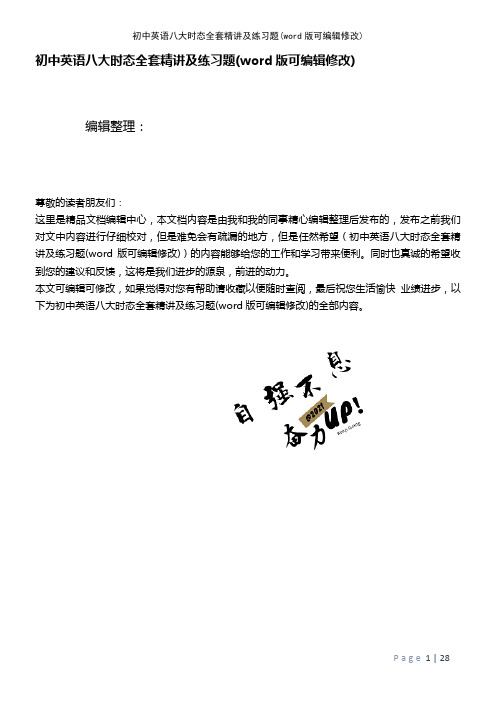
初中英语八大时态全套精讲及练习题(word版可编辑修改)编辑整理:尊敬的读者朋友们:这里是精品文档编辑中心,本文档内容是由我和我的同事精心编辑整理后发布的,发布之前我们对文中内容进行仔细校对,但是难免会有疏漏的地方,但是任然希望(初中英语八大时态全套精讲及练习题(word版可编辑修改))的内容能够给您的工作和学习带来便利。
同时也真诚的希望收到您的建议和反馈,这将是我们进步的源泉,前进的动力。
本文可编辑可修改,如果觉得对您有帮助请收藏以便随时查阅,最后祝您生活愉快业绩进步,以下为初中英语八大时态全套精讲及练习题(word版可编辑修改)的全部内容。
初中英语八大时态全套精讲及练习题.1 一般现在时的用法1)经常性或习惯性的动作,常与表示频度的时间状语连用。
时间状语: every…, sometimes,ofen,always,usually, twice a week, at…, on Sunday I leave home for school at 7 everymorning。
He watches Tv once a week 。
2) 客观真理,客观存在,科学事实.The earth moves around the sun。
Shanghai lies in the east of China.3)表示格言或警句中。
Pride goes before a fall。
骄者必败。
注意:此用法如果出现在宾语从句中,即使主句是过去时,从句谓语也要用一般现在时。
例:Columbus proved that the earth is round。
.4) 现在时刻的状态、能力、性格、个性.I don't want so much.Ann Wang writes good English but does not speak well。
比较:Now I put the sugar in the cup.I am doing my homework now。
(word完整版)初中英语时态讲解及练习(含答案),推荐文档

时态1. 一般现在时●形式:do does(单数第三人称)●意义:一般现在时表示客观的、普遍性的真理以及经常性的事件。
●用法:A) 表示现在发生的动作、情况、状态和特征。
B) 经常性、习惯性动作。
e.g.:He always helps others. (他总是帮助别人。
)He often goes to the gym.C) 客观事实和普遍真理。
尤其要注意,如果前后文不是一般现在时,则无法保持主句、从句时态一致。
e.g.: The sun rises in the east and sets in the west.Knowledge is power.●这一用法场合一些表动作频率的时间副词连用:1). 表示肯定的频率副词:always, frequently, usually, sometimes, generally, occasionally, often etc.2). 表示否定的频率副词:never, seldom, rarely etc.➢这些副词的位置:在Be动词后,实义动词前。
e.g. He is always late.2. 一般过去时●形式:did●意义:一般过去时表示在过去的某一特定时间发生和结束的活动或情况。
●用法:A) 表示过去某个时间发生的动作或情况。
e.g.: I saw him in the library yesterday morning. (有特定的时间状语)➢yesterday, yesterday evening, last night/month/spring/year, the night before last(前天晚上),three days/months/years ago, in 1999 etc.。
这些时间状语之前不用加介词。
B) 表示过去习惯性动作,一直持续或反复发生的动作,此时可与表示拼读的时间副词连用。
e.g.: I slept for eight hours last night. (表示在过去某一段时间内持续的动作,但这动作现在已经结束了)3. 一般将来时●形式:will/shall do或be going to do●意义:一般将来时表示在未来的某个时间将要发生的某个动作或状态。
初中英语八大时态全套精讲及练习题(附答案)
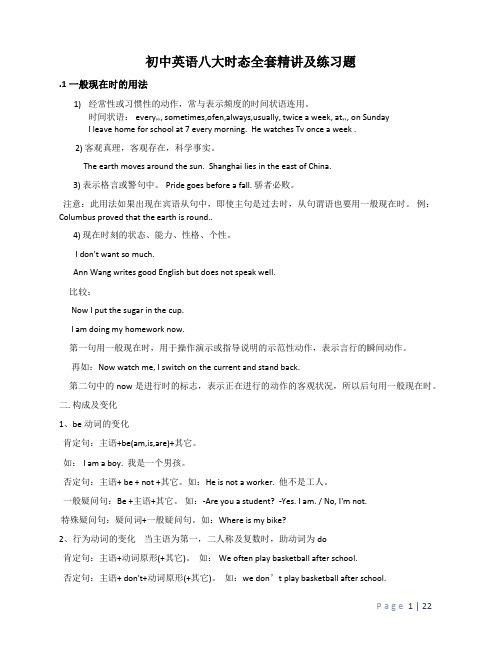
初中英语八大时态全套精讲及练习题.1 一般现在时的用法1)经常性或习惯性的动作,常与表示频度的时间状语连用。
时间状语: every…, sometimes,ofen,always,usually, twice a week, at…, on SundayI leave home for school at 7 every morning. He watches Tv once a week .2) 客观真理,客观存在,科学事实。
The earth moves around the sun. Shanghai lies in the east of China.3) 表示格言或警句中。
Pride goes before a fall. 骄者必败。
注意:此用法如果出现在宾语从句中,即使主句是过去时,从句谓语也要用一般现在时。
例:Columbus proved that the earth is round..4) 现在时刻的状态、能力、性格、个性。
I don't want so much.Ann Wang writes good English but does not speak well.比较:Now I put the sugar in the cup.I am doing my homework now.第一句用一般现在时,用于操作演示或指导说明的示范性动作,表示言行的瞬间动作。
再如:Now watch me, I switch on the current and stand back.第二句中的now是进行时的标志,表示正在进行的动作的客观状况,所以后句用一般现在时。
二. 构成及变化1、be动词的变化肯定句:主语+be(am,is,are)+其它。
如: I am a boy. 我是一个男孩。
否定句:主语+ be + not +其它。
如:He is not a worker. 他不是工人。
(最新整理)初中英语八大时态讲解及练习(全)
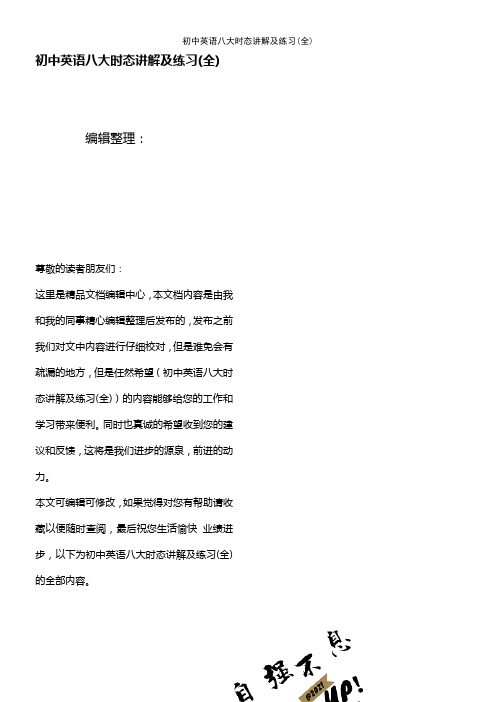
初中英语八大时态讲解及练习(全)初中英语八大时态讲解及练习(全)编辑整理:尊敬的读者朋友们:这里是精品文档编辑中心,本文档内容是由我和我的同事精心编辑整理后发布的,发布之前我们对文中内容进行仔细校对,但是难免会有疏漏的地方,但是任然希望(初中英语八大时态讲解及练习(全))的内容能够给您的工作和学习带来便利。
同时也真诚的希望收到您的建议和反馈,这将是我们进步的源泉,前进的动力。
本文可编辑可修改,如果觉得对您有帮助请收藏以便随时查阅,最后祝您生活愉快业绩进步,以下为初中英语八大时态讲解及练习(全)的全部内容。
一、一般现在时:概念:经常、反复发生的动作或行为及现在的某种状况。
时间状语:always, usually, often, sometimes, every week (day, year, month…), once a week, on Sundays, etc。
基本结构:①be动词;②行为动词否定形式:①am/is/are+not;②此时态的谓语动词若为行为动词,则在其前加don’t,如主语为第三人称单数,则用doesn’t,同时还原行为动词。
一般疑问句:①把be动词放于句首;②用助动词do提问,如主语为第三人称单数,则用does,同时,还原行为动词。
在一般现在时中,当主语是第三人称单数时,谓语动词要用第三人称单数形式,即常在动词原形后加-s或—es。
一、人称代词he, she, it是第三人称单数。
如:He likes watching TV. 他喜欢看电视。
She has lunch at twelve。
她十二点吃午餐.It looks like a cat. 它看起来像只猫.(口诀:I用am,you用are,is用于她他它,单数名词用is,复数名词都用are)二、单个人名、地名或称呼作主语;是第三人称单数。
如:①Han Mei looks like her mother。
韩梅看起来像她的母亲。
人教版英语九年级全册动词时态和语态知识点及相应习题
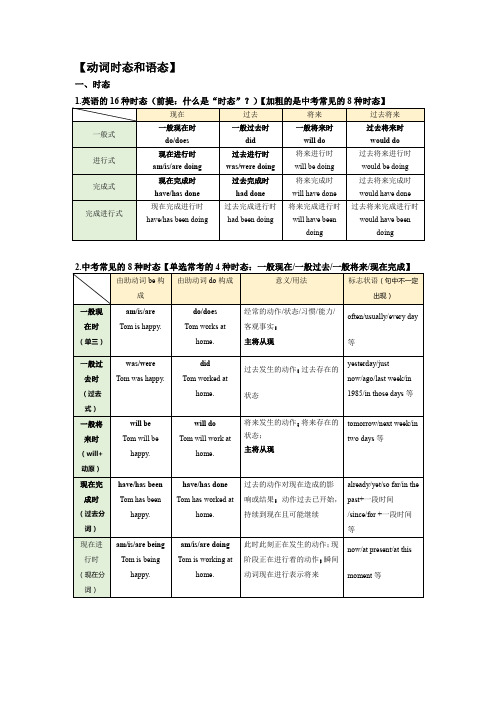
【动词时态和语态】一、时态3.主将从现(1)条件状语从句由if(如果)、as long as(只要)、unless(除非)引导,主句为一般将来时或表述将来含义,从句用一般现在时。
例如:She had better travel with a local tour guide if she wants to know more about the culture.(2)时间状语从句由when(当……时候)、as soon as(一……就……)、until(直到)等引导,主句为一般将来时或表述将来含义,从句用一般现在时。
例如:I’ll discuss this matter with you when we meet next time. / We won’t leave until Mary arrives.考点5 现在完成时have/has+(not+)过去分词(1)表示过去的动作对现在产生的结果和影响现在完成时表示过去某个时间曾经做过的、发生过的事情,对目前的某种影响,这时一般不用时间状语;也可以表示到目前为止没有发生或经历的事情。
The tickets have sold out.(票已售空。
)I have tried Italian food. It’s delicious!(我已经尝过意大利美食了。
美味啊!)Simon has seen the concert. He doesn’t want to see it again.(西蒙已经看过这场演唱会,不想再看了。
)I have never visited San Francisco in the U.S.A.(我从没去过美国的旧金山。
)(说明过去没有去过,现在仍没去过)I have just heard the news that our school will set up a press club.(我刚听到消息说我们学校要成立一个记者俱乐部。
(完整版)初中英语8种时态练习及答案
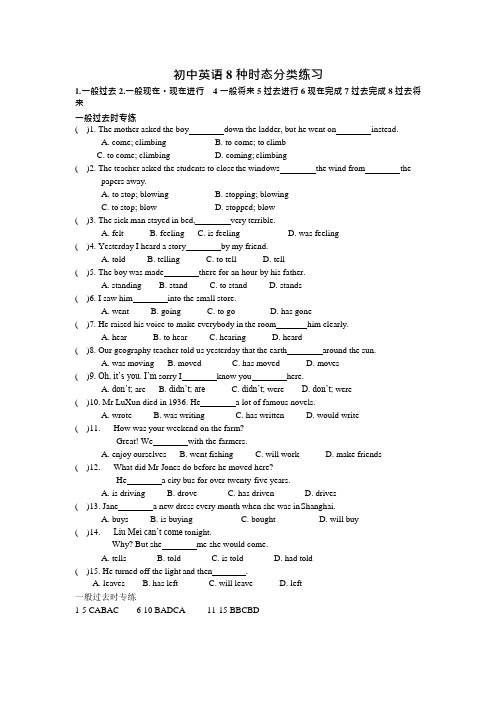
初中英语8 种时态分类练习1.一般过去2.一般现在。
现在进行 4 一般将来5 过去进行6 现在完成7 过去完成8 过去将来一般过去时专练( )1. The mother asked the boy down the ladder, but he went on instead.A. come; climbingB. to come; to climbC. to come; climbingD. coming; climbing( )2. The teacher asked the students to close the windows the wind from the papers away.A. to stop; blowingB. stopping; blowingC. to stop; blowD. stopped; blow( )3. The sick man stayed in bed, very terrible.A. feltB. feelingC. is feelingD. was feeling( )4. Yesterday I heard a story by my friend.A. toldB. tellingC. to tellD. tell( )5. The boy was made there for an hour by his father.A. standingB. standC. to standD. stands( )6. I saw him into the small store.A. wentB. goingC. to goD. has gone( )7. He raised his voice to make everybody in the room him clearly.A. hearB. to hearC. hearingD. heard( )8. Our geography teacher told us yesterday that the earth around the sun.A. was movingB. movedC. has movedD. moves( )9. Oh, it’s you. I’m sorry I know you here.A. don’t; areB. didn’t; areC. didn’t; wereD. don’t; were( )10. Mr LuXun died in 1936. He a lot of famous novels.A. wroteB. was writingC. has writtenD. would write( )11. --- How was your weekend on the farm?--- Great! We with the farmers.A. enjoy ourselvesB. went fishingC. will workD. make friends( )12. --- What did Mr Jones do before he moved here?--- He a city bus for over twenty-five years.A. is drivingB. droveC. has drivenD. drives( )13. Jane a new dress every month when she was in Shanghai.A. buysB. is buyingC. boughtD. will buy( )14. --- Liu Mei can’t come tonight.--- Why? But she me she would come.A. tellsB. toldC. is toldD. had told( )15. He turned off the light and then .A. leavesB. has leftC. will leaveD. left一般过去时专练1-5CABAC 6-10 BADCA 11-15 BBCBD一般现在时与现在进行时专练( ) 1. Father usually his newspaper after dinner.A. readB. readsC. readingD. is reading( ) 2. The Blacks often to the cinema on Saturday evenings.A. goB. goesC. is goingD. are going( ) 3.Look! The boy with his mother in the pool.A. is swimmingB. is swimmingC. are swimmingD. are swiming( ) 4.--- What is Tom doing in the classroom? --- He something on the blackboard.A. drawsB. drawC. is drawingD. are drawing.( ) 5.Old Tom usually up at six and sports in the garden.A. gets, dosB. gets, doesC. get, doesD. gets, do( ) 6. It’s ten o’c lock and Jack still(仍然) his homework.A. is, doB. is, doingC. are, doD. are, doing( ) 7. The waiters to work at five every morning.A. startB. startsC. startingD. are starting( ) 8.I a letter, so I can’t go out with you.A. is writingB. am writingC. am writeingD. am writting( )9.A hundred days quite a long time.A. isB. areC. haveD. has( )10. -- late for the meeting next time. –Sorry, I won’t.A. Don’tB. Don’t beC. Won’t beD. Be not( )11. My mother noodles, but my father .A. likes, doesn’tB. don’t like, doC. likes, didn’tD. didn’t like, do( )12. The picture nice.A. looksB. is lookedC. lookD. is looking( )13. The students will go to the Summer Palace if it tomorrow.A. don’t rainB. doesn’t rainC. won’t rainD. isn’t rain( )14. We are always ready others.A. to helpingB. to helpC. helpD. helping( )15. I often hear her about the boy.A. talkingB. talkC. to talkD. talked( )16. He’s already a little weak in Chinese, he ?A. isB. isn’tC. hasD. hasn’t( )17.Potatoes are in the field by the farmers.A. growB. growingC. grownD. grew( )18. Does she have a watch? – Yes, she .A. haveB. doC. hasD. does( )19. She English very much now.A. is likingB. likesC. likedD. is teaching( )20. She has no paper to . Why not give her some?A. writeB. be writingC. write onD. write in( )21. Does Mr Know-all know keys?A. to makeB. how to makeC. how makeD. making( )22. Does your mother English now?A. teachesB. teachC. taughtD. is teaching( )23. Jack usually mistakes last term. But this term he does better.A. makesB. madeC. doesD. did( )24. The boy is too young, please carefully.A. look after himB. look him afterC. look at himD. look him at ( )25. She you to come to my birthday party.A. hopesB. wishesC. wantD. lets( )26. --Where is Frank now? -- He his bike in the yard.A. fixes upB. fixing upC. is fixing upD. fixed( )27. Bob often his mother with the housework on Sundays.A. helpB. helpingC. helpsD. helped( )28. The students will go to the Summer Palace if it tomorrow.A. don’t rainB. doesn’t rainC. won’t rainD. isn’t rain( )29. If it tomorrow, I will go by car.A. rainB. will rainC. rainsD. would rain( )30. --What a nice garden! –She it every day.A. is cleaningB. has cleanedC. cleansD. clean( )31. --Where is Peter? -- He his homework in the room.A. is doingB. doesC. didD. do( )32. The teacher told us that light much faster than sound.A. travelsB. traveledC. wasD. will be( )33. My mother told us that Taiwan part of China.A. isB. areC. wasD. were( )34. Do you know bananas in Hainan?A. growsB. is grownC. grewD. are grown( )35. The clothes very soft.A. are feltB. are feelingC. feelD. feels( )36. The supermarket is far from Mary’s house. So she only once a week.A. goes shoppingB. has been thereC. was shoppingD. has gone there ( )37. Don’t make so much noise. We to the music.A. are listeningB. listenC. listenedD. have listened( )38. I’ll go swimming with you if I free tomorrow.A. will beB. shall beC. amD. was( )39. – Oh, Mrs. King, your sweater looks nice. Is it wool ?-- Yes, and it’s Inner Mongolia.A. made of, made byB. made of, made inC. made by, made forD. made by, made from一般现在时与现在进行时专练1-5BAACB 6-10BABAB 11-15AABBB 16-20 BCDBC21-25 BBBAC 26-30 CCBAC 31-35 AAABC 36-39 AACB3.一般将来时专练( )1. Her hope the 2008 Olympic Games.A. to take part inB. is to take part inC. taking part inD. will take part in( )2. --- Can I go to Beijing for my holiday, Dad? --- You can when you a bit older.A. will getB. getC. are gettingD. got( )3. If he harder, he will catch up with us soon.A. studyB. studiesC. will studyD. studied( )4. --- Don’t forget to ask him to write to me.--- I won’t. As soon as he , I’ll ask him to write to you.A. will comeB. cameC. comesD. is coming( )5. --- Jimmy is leaving for a holiday.--- Really? Where he ?A. has; goneB. will; goC. did; goD. would; go( )6. Frank to see his grandma if he free tomorrow.A. will come; will beB. comes; isC. will come; isD. comes; will be( )7. There a talk on science in our school next Monday.A. will giveB. will beC. is going to giveD. is( )8. --- Shall we go shopping now?--- Sorry, I can’t. I my shirts.A. washB. washesC. washedD. am washing( )9. I believe that those mountains with trees in a few years’ time.A. are coveredB. will be coveredC. are coveringD. will cover( )10. It is said that about 400 cars in the factory next month.A. were producedB. will produceC. are producedD. will be produced( )11. --- Are you free this afternoon?--- No. I’ll have an English composition this afternoon.A. to writeB. wroteC. to be writingD. to be written( )12. --- Come back home every month.--- I .A. willB. mustC. shouldD. can( )13. A robot think of itself; it be told what to do.A. can’t; mustB. couldn’t; canC. may not; willD. mustn’t, may一般将来时专练1-5 BBBCB 6-10 CBDBD 11-13 AAA4.过去进行时专练二、用动词的适当形式填空。
初中英语语法:动词时态讲解及练习
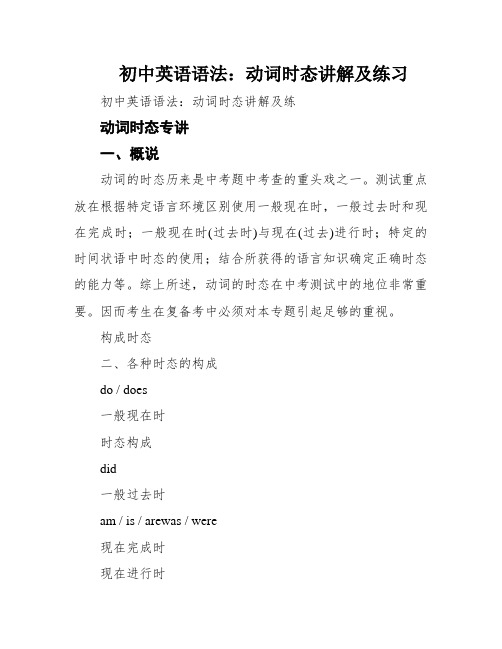
初中英语语法:动词时态讲解及练习初中英语语法:动词时态讲解及练动词时态专讲一、概说动词的时态历来是中考题中考查的重头戏之一。
测试重点放在根据特定语言环境区别使用一般现在时,一般过去时和现在完成时;一般现在时(过去时)与现在(过去)进行时;特定的时间状语中时态的使用;结合所获得的语言知识确定正确时态的能力等。
综上所述,动词的时态在中考测试中的地位非常重要。
因而考生在复备考中必须对本专题引起足够的重视。
构成时态二、各种时态的构成do / does一般现在时时态构成did一般过去时am / is / arewas / were现在完成时现在进行时一般将来时am / is / are + doinghave / has + doneshall / will + do曩昔完成时过去进行时过去将来时was / were + doingwould + dohad + donewas / were going + to doam / is / are going + to do普通目前时三、各种时态的用法1.透露表现经常性或气性的举措,常与透露表现频度的工夫状语连用。
时间状语:every day,every other day,sometimes,often,usually,on Sunday …I leave home for school at 7 _________________ (天天清晨).The Olympic Games are held ____________________ (每四年).What do you ____________ (平日) do when you are free on Sunday?2.用在客观真理,客观存在,科学事实或格言警句中。
The earth _________________ (绕着……转) the sun.Shanghai lies in the east of China.上海__________中国的东方。
初中英语现在完成时态详细讲解及其练习

注意事项
单击此处可添加副标题
have been(to)与 have gone( to)的区别:have been(to)表示“去过某地(现在已经回来了)”,可用于 各人称;have gone(to)表示“去某地了(说话时某人不 在当地)”,常用于第三人称,前者可与 once , never, several times 等连用,后者则不能。
pictures ❖ (A ) has just (B)have ever (C)has yet
(D)have already
❖ 二 选择填空
_ ❖ ( ) 1. ——Have you finished your homework ——Yes, I it last night ❖ (A) finish (B) finished (C) have finished (D) will finish
三 用 since 和 for 填空 (一)
❖ 1) ______ two years _______ two years ago 2) _______ last month 3) _______ yesterday 4) _______ an hour ago 5) ______ she left here 6) _______ 4 o’clock 8) ______ 1999
归纳总结:由非延续性动词到延续性动 词的转换
• arrive→be here die →be dead begin (start)→ be on • come back→ be back fall ill (sick, asleep )→be ill (sick,
asleep) leave →be away get up→ be up finish →be over • open →be open close →be closed borrow →keep • be on →be in 或 be a member of… go to school→be a
初中英语时态讲解(完整版)
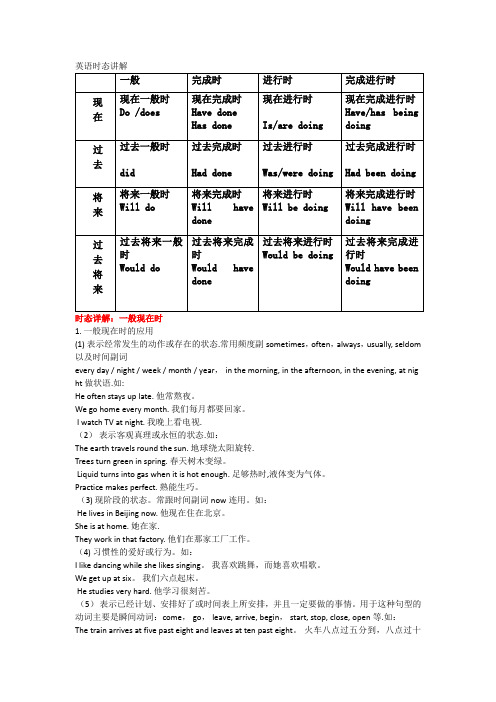
英语时态讲解1.一般现在时的应用(1)表示经常发生的动作或存在的状态.常用频度副sometimes,often,always,usually,seldom 以及时间副词every day/night/week/month/year,in the morning,in the afternoon,in the evening,at nig ht做状语.如:He often stays up late.他常熬夜。
We go home every month.我们每月都要回家。
I watch TV at night.我晚上看电视.(2)表示客观真理或永恒的状态.如:The earth travels round the sun.地球绕太阳旋转.Trees turn green in spring.春天树木变绿。
Liquid turns into gas when it is hot enough.足够热时,液体变为气体。
Practice makes perfect.熟能生巧。
(3)现阶段的状态。
常跟时间副词now连用。
如:He lives in Beijing now.他现在住在北京。
She is at home.她在家.They work in that factory.他们在那家工厂工作。
(4)习惯性的爱好或行为。
如:I like dancing while she likes singing。
我喜欢跳舞,而她喜欢唱歌。
We get up at six。
我们六点起床。
He studies very hard.他学习很刻苦。
(5)表示已经计划、安排好了或时间表上所安排,并且一定要做的事情。
用于这种句型的动词主要是瞬间动词:come,go,leave,arrive,begin,start,stop,close,open等.如:The train arrives at five past eight and leaves at ten past eight。
(完整版)初中英语语法-八种时态详解与练习

初中英语语法:八种时态详解与练习一.概念:英语中表示不同时间发生的动作或存在的状态,需用不同的动词形式表示,这种不同的动词形式称为时态。
二.种类:(基本时态)一般现在时一般过去时现在进行时过去进行时一般将来时过去将来时现在完成时过去完成时一般现在时一、概念:经常、反复发生的动作或行为及现在的某种状况.二、常搭配的时间状语:always, usually, often, sometimes, every week (day, year, month…), once a week,on Sundays, etc。
三、基本结构①be动词(is,am,are);②行为动词(主语是第三人称单数时谓语动词要加s或es外)否定形式:①am/is/are+not;②此时态的谓语动词若为行为动词,则在其前加don't,如主语为第三人称单数,则用doesn't,同时还原行为动词.一般疑问句:①把be动词放于句首;②用助动词do提问,如主语为第三人称单数,则用does,同时,还原行为动词。
例句:I go to school at 6 every morning. 每天早上我七点去上学。
Summer follows spring. 春天之后是夏天。
I learned that the earth goes around the sun when I was in primary school。
我在小学就学过地球是围绕太阳转的。
Pride goes before a fall。
骄者必败。
四、基本用法:1)描述当前时间内经常出现、反复发生的动作或存在的状态。
在这种情景中,句子常带有表示频率的时间状语:always , everyday , often , once a week (month , year , etc.), sometimes , seldom , usually等等,以表示句中的动作或状态是习惯性的、经常性的。
(完整word版)初中八种基本时态讲解及练习
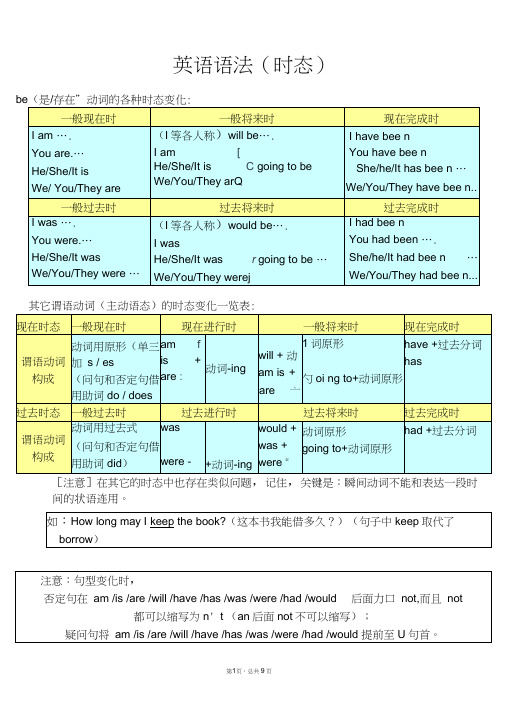
英语语法(时态)be(是/存在”动词的各种时态变化:其它谓语动词(主动语态)的时态变化一览表:[注意]在其它的时态中也存在类似问题,记住,关键是:瞬间动词不能和表达一段时间的状语连用。
八种时态的具体用法:(1)一般现在时:表示现阶段经常或习惯发生的动作或存在的状态,或说明主语的特征。
①一般现在时句子中常有的时间状语:ofte n,usually,sometimes,always,every(day 等),once/twice,a (week等),on (Sunday 等),never,in the (morning等)。
女口:They go to the Palace Museum once a year(他们每年去一次故宫” They ofte n discuss bus in ess in the eve ning(他们经常在晚上商谈生意)②表示客观真理、事实、人的技能或现在的状态时句子里一般不用时间状语。
女口:The earth turns round the sun.(地球绕着太阳转)/Light travels faster than sound .(光传播比声音快)③表示十分确定会发生(如安排好的事情)或按照时间表进行的事情,用一般现在可以表达将来句子中可以有将来时间。
如: The train for Haikou leaves at 8 : 00 in the morning.(开往海口的列车上午8 点开车)④在时间状语从句中(以when, after, before, while, until, as soon as等引导)和条件状语从句中(以if,unless引导),用一般现在时代替一般将来时,句子可以有将来时间。
女口:Please ring me up as soon as you arrive in Germany.(你一至U德国就给我打电话)/If it rains tomorrow.we will have to stay at home. (如果明天下雨我们就只好呆在家)⑤一般现在时用于倒装句中可以表示正在发生的动作,动词以come, go为主。
初中英语时态讲解及练习

谓语动词使用过去式形式, 加ed,分为规则和不规则变 化。表示过去经常发生的动 作,也可用“used to do ” 和“would +动词原形”。
构成规则
例子
一般在动词原形末尾加-ed,(在清 look→looked 辅音后读/t/;在浊辅音和元音后读 play→played /d/;在/t/,/d/后读/id/。 work→worked
1.I ____(write, am writing, is writing, are writing) a letter now. 2.Look, it _____(begin, is beginning, am beginning, are beginning) to rain. 3.They ____(study, is studying, am studying, are studying) medicine at the Medical Institute of Chengde these days. 4.He _____(teach, am teaching, is teaching, are teaching) an English lesson at this time.
结尾是e的动词在末尾加-d
like→liked live→lived hope→hoped
末尾只有一个辅音字母的重读闭音 plan→planned 节,先双写这个辅音字母,再加-ed stop→stopped drop→dropped 结尾是“辅音字母+y”的动词,先 study→studied worry→worried 变“y”为“i”再加-ed cry→cried
一般将来时
构成:①will,shall+动词原形,其中shall只用 于第一人称。②be going to +动词原形,表 示主观打算,按计划,安排要发生的事情。 ③be to +动词原形,表示客观安排 ④ be about to +不定式,意为马上要做某事,正 要做某事。⑤某些动词,可用进行时态表 将来,如come, go, arrive, leave。⑥在时间 状语从句和条件状语从句中,主句用一般 将来时(will+动词原形),从句中用一般现 在时表将来。⑦一般现在时可表示按时间 表发生的将来的动作(限start, begin, arrive, end, close, leave---等表示开始或移动意义的 词)
初中英语时态讲解与练习

初中英语时态讲解与练习(总37页) -CAL-FENGHAI.-(YICAI)-Company One1-CAL-本页仅作为文档封面,使用请直接删除初中英语时态讲解时态是英语学习中一个至关重要的内容,广大初中学生在实际运用时,往往对时态问题倍感棘手,下面我们就归纳复习一下这几种时态。
一、一般现在时(一)定义表示经常性或习惯性的动作,或存在的状态,还表示主语具备的性格和能力及客观真理。
例:I get up at 6:30 in the morning .She is at home .(二)构成主要用动词原形表示,当主语是第三人称单数时,在动词词尾加s/es。
(三)句型1、肯定句:主语+谓语+其他。
She reads English everyday .2、否定句:主语+don’t/doesn’t+谓语+其他。
He doesn’t get up at 6:30 in the morning .3、一般疑问句:Do/Does+主语+V原+其他?Do you like English Yes ,I do ./No, I don’t .4、特殊疑问句:特殊疑问词+do/does+主语+V原+其他?What time do you get up every morningWhere does your father work(三)用法1、表示经常性或习惯性的动作,或存在的状态,带与表示频率的时间状语如:often , sometimes , usually,always , everyday year,month...) , once/twice a week (month , year , etc.) , seldom , on sundays等连用。
I leave home for school at seven every morning .2、表示客观真理,科学事实、格言警句。
The sun rises in the east .日出东方。
初中英语时态讲解及练习共54页

40、人类法律,事物有规律,这是不 容忽视 的。— —爱献 生
谢谢你的阅读
❖ 知识就是ห้องสมุดไป่ตู้富 ❖ 丰富你的人生
71、既然我已经踏上这条道路,那么,任何东西都不应妨碍我沿着这条路走下去。——康德 72、家庭成为快乐的种子在外也不致成为障碍物但在旅行之际却是夜间的伴侣。——西塞罗 73、坚持意志伟大的事业需要始终不渝的精神。——伏尔泰 74、路漫漫其修道远,吾将上下而求索。——屈原 75、内外相应,言行相称。——韩非
初中英语时态讲解及练习
36、如果我们国家的法律中只有某种 神灵, 而不是 殚精竭 虑将神 灵揉进 宪法, 总体上 来说, 法律就 会更好 。—— 马克·吐 温 37、纲纪废弃之日,便是暴政兴起之 时。— —威·皮 物特
38、若是没有公众舆论的支持,法律 是丝毫 没有力 量的。 ——菲 力普斯 39、一个判例造出另一个判例,它们 迅速累 聚,进 而变成 法律。 ——朱 尼厄斯
